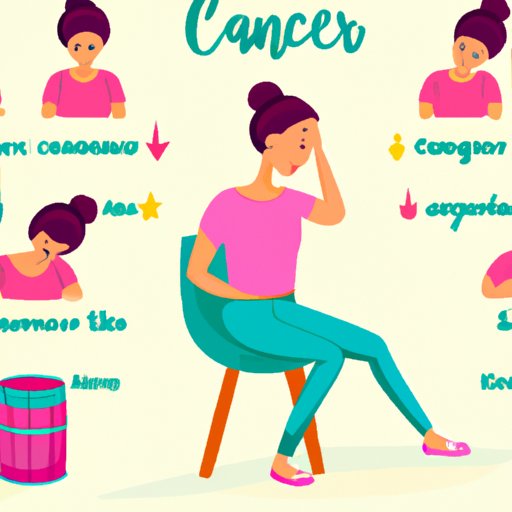
Introduction
Being diagnosed with cancer can be a life-changing experience. The journey can be exhausting, both physically and emotionally. Cancer-related fatigue is a common side effect experienced by cancer patients that often goes unnoticed and left untreated. In this article, we will be exploring the link between cancer and fatigue, as well as offering tips and strategies for managing symptoms, debunking myths, and discussing the importance of self-care to help cope with this debilitating condition.
The Link between Fatigue and Cancer: Understanding the Science behind the Exhaustion
Fatigue is a common side effect experienced by people battling cancer. It is often described as an overwhelming sense of tiredness that is not relieved by sleep or rest. Research has suggested that cancer-related fatigue can be caused by a combination of factors such as the disease itself, treatments, and emotional distress.
Cancer treatments like chemotherapy, radiation, and surgery can also contribute to fatigue. In chemotherapy, for instance, the drugs that are administered to a patient can cause a drop in red blood cells, leading to anemia and fatigue. Radiation, on the other hand, can cause damage to tissues and cells leading to physical exhaustion and weakness.
Overcoming Cancer-Related Fatigue: Tips and Strategies to Boost Your Energy and Improve Your Quality of Life
While it may be difficult to completely eliminate fatigue, there are various strategies and lifestyle changes that can help alleviate the symptoms of cancer-related fatigue.
Exercise: Staying active can boost energy levels and improve sleep quality, which in turn reduces the feeling of fatigue. Light exercises such as walking, yoga, and stretching are recommended, but patients must consult their doctors before engaging in any physical activities.
Healthy Eating: Eating a balanced diet can provide the body with the required nutrients to maintain energy levels and a healthy immune system. Patients should try to avoid processed foods, sugary drinks, and alcohol which can make fatigue worse.
Managing Symptoms: Getting enough sleep and practicing stress-reducing techniques such as yoga and meditation can improve physical and emotional well-being, promoting better coping with cancer fatigue.
Cancer Fatigue: How it Affects Patients and Survivors, and What You Can Do to Cope
Everyone’s cancer journey is unique. However, many people have experienced cancer-related fatigue. Cancer fatigue can be overwhelming and can come in various forms which include physical, mental, and emotional fatigue. It can affect patients during treatment and even after treatment has ended.
Real-life stories: It is essential to hear from other cancer patients to know that you’re not alone. Listening to survivors open up about their experiences with cancer-related fatigue can help gain insight into how to manage symptoms.
Coping mechanisms: Support groups, psychotherapy, and counselling are known to help cancer patients learn to cope with the mental, emotional, and physical stresses associated with the disease and the treatments.
The Importance of Self-Care for Cancer Patients Dealing with Exhaustion and Weakness
Self-care is all about paying attention to one’s emotional and physical needs. Patients can take complete control of their lives by implementing self-care routines and habits. Below are some of the self-care strategies that cancer patients can implement to help manage their cancer-related fatigue.
Eating well: Cancer patients should eat a balanced diet and avoid sugary foods and drinks. Weight management is essential during cancer treatment, and eating a balanced meal can help maintain a healthy weight.
Stay active: Light exercises like walking around the house or in the garden can provide numerous benefits to cancer patients. It can improve sleep, increase energy levels, better mood, and boost immunity.
Stay on top of your meds: Patients must follow their prescribed medication schedule to ensure they get the maximum benefits while minimizing side effects, including fatigue.
Debunking Myths about Cancer-Related Fatigue: What You Need to Know to Manage Your Symptoms
There are many myths about cancer-related fatigue. Busting out such untruths can help patients and caregivers know what to expect and how to navigate through the challenges posed by cancer-related fatigue.
Myth: Rest is enough to relieve fatigue
Fact: While rest is essential, too much of it can cause fatigue. People struggling with cancer fatigue often have too much rest and less activity, leading to weakened muscles and increased fatigue.
Myth: Cancer-related fatigue is permanent
Fact: Cancer fatigue can improve with proper management strategies. Patients through exercise, nutritional diet, counseling or medication, can improve their energy levels and reduce fatigue symptoms.
Navigating Work and Cancer-Related Fatigue: Practical Solutions for Patients and Survivors
Going through cancer treatment while working can be a challenge for some people. Fatigue, for instance, can disrupt workflow and cause difficulty in keeping up with deadlines and responsibilities. To help navigate work and cancer, patients can implement a few strategies that will ensure a less stressful working environment.
Effective communication: Patients should communicate effectively with their bosses and colleagues about their health conditions, work schedule, and workload capacity. This will help in coming up with an effective working plan that suits the employee and also helps meet the company’s targets.
Accommodating fatigue: Employers can provide an accommodating work environment to help cancer patients during the recovery phase. These accommodations could include flexible working hours, work from home opportunities, reduced workload, and breaks during work hours.
Seeking Help with Cancer-Related Fatigue: Support, Resources, and Treatment Options
Patients experiencing cancer-related fatigue should seek medical attention and counseling. Support groups, psychotherapy services, and relaxation techniques can significantly help in managing stress and anxiety. Patients can also seek treatment options such as medications for pain or sleep-depriving symptoms associated with cancer treatments.
Conclusion
Cancer-related fatigue is a common side effect experienced by cancer patients, and it can be challenging to manage alone. It is important to seek help and support from medical professionals and loved ones. With the right lifestyle changes, coping mechanisms, self-care, and accurate information about cancer-related fatigue, patients and survivors can reduce symptoms and improve their quality of life.





